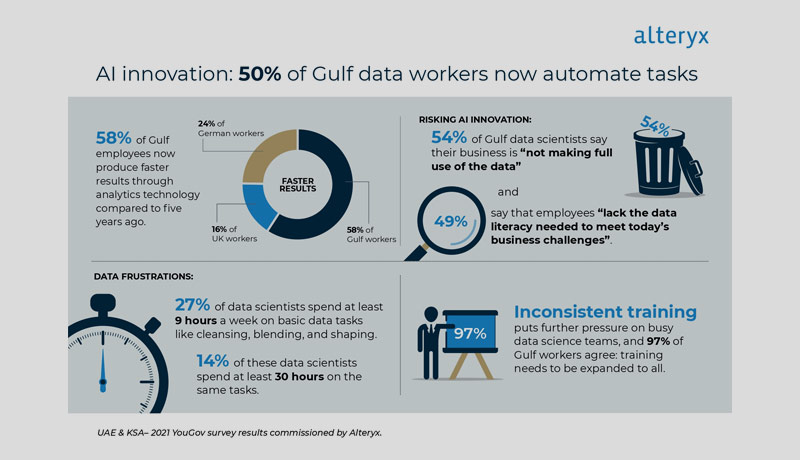
Alteryx, Inc. has released new research indicating that the Gulf is uniquely positioned to stimulate innovation following the epidemic. In comparison to five years ago, a whopping 50% of employees polled are now able to automate their day-to-day tasks, with 58 percent able to achieve faster outcomes through the use of analytics technology. In comparison, only 16 percent of British workers and 24% of German workers said they can automate equivalent operations. The YouGov survey, which Alteryx commissioned, polled 300+ individuals in the UAE and Saudi Arabia who work with data in significant corporations.

“While data is increasingly becoming the common language of business, few receive the training needed to deliver consistent benefit from it, with the remainder relegated to working in the dark,” comments Alan Jacobson, Chief Data and Analytic Officer at Alteryx.
He added, “ The lack of foundational data skills remains a significant stumbling block on the Gulf’s upward trajectory towards AI led innovation . Big data needs context and human intelligence when applied to AI. What we now see is an AI ethics conundrum. If not driven by data science, unintentional data biases can creep in, leading to perpetuated discriminatory practices, as well as inaccurate and inconsistent AI models.”

“Many business leaders believe that transformation and AI projects are exclusively about the technology, but any technology is only ever a tool to deliver human ingenuity,” comments Kerry Koutsikos, Regional Vice President, MEA, at Alteryx.
He added, “The lack of consistent training, and subsequent lack of standardised knowledge is a core challenge for the Gulf’s future technology projects – particularly new AI strategies.
“Data work and automation are taking place regardless of whether training is available. The challenge is the quality of data and outcomes generated across this skills spectrum. Instead of spending their time on advanced AI projects or value-driving work, data scientists are having their time sapped by basic data tasks that could – and should – be completed by other workers. It’s imperative that business leaders minimize the challenges that are being faced by delivering a core foundation of data skills to all workers and removing pressure from data and technology teams.”
Despite the essential elements for success, the study finds that the region is still hampered by inconsistently implemented training programmes, with only existing experts – such as credentialed data scientists – obtaining critical data upskilling.
Employees who haven’t received formal training are increasingly operating in the dark, adding to the workload of already overburdened data science teams. Data scientists spend a disproportionate amount of their time each week on jobs that might be handled by individuals with less sophisticated skillsets using automation technology, according to research, and are locked in a never-ending cycle of day-to-day tasks:
• At least 9 hours per week are spent on fundamental data activities like cleansing, blending, and shaping by 27% of data scientists.
• At least 30 hours are spent on the same tasks by 14% of data scientists polled.
• 54% of these data scientists think their company “isn’t making full use of data,” and 49% say staff “lack the lata literacy abilities required to handle today’s business challenges.”
With such a huge skills gap, the efforts of highly trained data scientists are being wasted. 97% of employees now say that data training should be expanded to all data workers instead of remaining focused on existing data experts.
